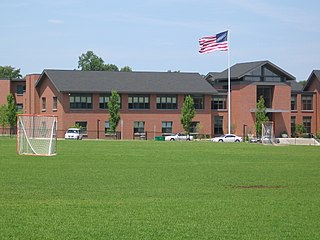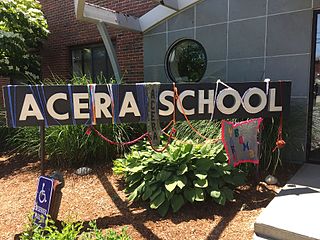Related Research Articles

The Johns Hopkins Center for Talented Youth (CTY) is a gifted education program for school-age children founded in 1979 by psychologist Julian Stanley at Johns Hopkins University. It was established as a research study into how academically advanced children learn and became the first program to identify academically talented students through above-grade-level testing and provide them with challenging learning opportunities.

The Texas Academy of Mathematics and Science (TAMS) is a two-year residential early entrance college program serving approximately 375 high school juniors and seniors at the University of North Texas. Students are admitted from every region of the state through a selective admissions process. TAMS is a member of the National Consortium for Specialized Secondary Schools of Mathematics, Science and Technology.
Gifted education is a sort of education used for children who have been identified as gifted or talented.
The Duke University Talent Identification Program was a gifted education program based at Duke University. Founded in 1980 as one of the first pre-collegiate studies programs offered by an American university, the program aimed to identify gifted students in grades four through twelve and provide advanced educational opportunities, as well as social and emotional support. The Duke TIP program permanently ended in 2020 because of the COVID-19 pandemic.
Early entrance to college, sometimes called early admission or early enrollment, is the practice of allowing students to be accelerated into college, one or more years before the traditional age of college entrance, and without obtaining a high school diploma. In some cases this is done individually. Often, however, it is done as part of a cohort acceleration program, in which many such students are accelerated into college together at the same time. These programs are usually targeted to gifted students, and may provide the students with a social support network and help in dealing with the adjustment.
The educational system in Taiwan is the responsibility of the Ministry of Education. The system produces pupils with some of the highest test scores in the world, especially in mathematics and science.

Pine View School for the Gifted, or simply known as Pine View School, is a public, college-preparatory, coeducational school located in Osprey, Florida. Pine View serves students from 2nd through 12th grades.

The Nueva School is a private school, with two campuses—the lower and middle school in Hillsborough, and the high school in San Mateo, California—serving gifted students in pre-kindergarten through twelfth grade. Nueva was founded in 1967 by Karen Stone McCown. Originally, the Nueva School only served younger students, but in 2013 it expanded to include a high school, and a new campus for it was built as part of the Bay Meadows development in San Mateo, opening in August 2014.
Northwestern Lehigh School District is a public school district in northwest Lehigh County, Pennsylvania in the Lehigh Valley region of eastern Pennsylvania. It serves Heidelberg, Lowhill, Lynn, and Weisenberg Townships.

Darien High School is the single public high school serving the town of Darien, Connecticut, in the United States.
Center for Talent Development (CTD), established in 1982, is a direct service and research center in the field of gifted education and talent development based at Northwestern University.
Mayfield Senior School is an independent Catholic college preparatory school, founded in 1931 for young women grades 9-12. It is sponsored by the Society of the Holy Child Jesus, a member of the Holy Child Network of Schools and is guided by the educational philosophy of the Society's foundress, Cornelia Connelly.

Seabury Hall is a private college preparatory school in Makawao. It is affiliated with the Episcopal Church. It was founded in 1964 and serves middle and high school students'. Seabury Hall has been designated as a U.S. Department of Education Blue Ribbon School. The Seabury Hall mascot is a Spartan and the school colors are blue and red. Perched high on the slopes of Haleakala, Seabury Hall offers views of the rest of Maui, the Pacific, and the islands of Kahoolawe, Lanai, and Molokai.

Academic acceleration is moving students through an educational program at a rate faster or at an age younger than is typical. Students who would benefit from acceleration do not necessarily need to be identified as gifted in a particular subject. Acceleration places them ahead of where they would be in the regular school curriculum. It has been described as a "fundamental need" for gifted students as it provides students with level-appropriate material. The practice occurs worldwide. The bulk of educational research on academic acceleration has been within the United States.
The Special Class for the Gifted Young is a program aimed to select gifted young students to enter the universities in China. First established in 1978 at the University of Science and Technology of China, it was a major innovation in China's higher education. Eminent scientists including Tsung-Dao Lee, C. N. Yang, and Samuel C. C. Ting proposed creating the program, and the then Vice-premier of the State Council Fang Yi backed it. The objective of the class is to explore the most efficient ways to nurture promising youth. Peking University, Tsinghua University, Nanjing University, Wuhan University, Jilin University, Shanghai Jiaotong University and Huazhong University of Science and Technology also launched similar programs. But they were all shut down for all kinds of reasons. Currently, only the University of Science and Technology of China and Xi'an Jiaotong University still have this program.
Whitney M. Young School is a selective-enrollment public school in Cleveland, in the U.S. state of Ohio, notable as the city's first public gifted and talented school.. Named after Whitney M. Young Jr., a prominent civil rights leader, the school is located in Cleveland's Lee-Harvard neighborhood.
Seabury School is an independent school for gifted children in Tacoma, Washington.
Pear Tree Point School was a co-educational private day school, grades Pre-Kindergarten-Grade 6 in Darien, Connecticut.

The Acera School is an independent, nonprofit, co-educational day school in Winchester, Massachusetts, United States, serving gifted students across Greater Boston in grades K–8 with the option for a bonus Grade 9. Acera's approach to gifted education is prioritizes engaging students in meaningful learning given each students’ unique capacities, needs, and passions. It emphasizes the development of core capacities such as systems thinking, critical thinking and problem solving, creativity, ethical decision making, perspective taking, collaboration, emotional intelligence, and leadership.
The Jack Kent Cooke Foundation is a private, independent foundation which provides scholarship programs to gifted students in the U.S. who have financial need. It offers academic advising and other support services to students from 8th grade to graduate school. Since 2000, it has awarded over $175 million in scholarships to nearly 2,300 students and more than $97 million in grants to organizations that serve gifted low-income students.
References
- ↑ "Institute for Educational Advancement Celebrated Milestone at 20th Anniversary Celebration – Pasadena Now". www.pasadenanow.com. Retrieved 2024-02-24.
- ↑ Wietecha, Marsha (2023-05-22). "Elizabeth Jones". Born To Talk. Retrieved 2025-01-27.
- 1 2 Rivera, Carla (2008-05-12). "Are gifted students getting left out?". Los Angeles Times. Retrieved 2025-01-27.
- ↑ "Darien Students Attend Yunasa Summer Camp". Darien, CT Patch. 2012-07-25. Retrieved 2024-02-24.
- 1 2 "Caroline D. Bradley Scholarship". Center for Talented Youth, Johns Hopkins University. 2012. Archived from the original on 21 October 2013. Retrieved 30 November 2012.
- ↑ "2 Gifted Mill Valley Students Win Full Ride To High School". Yahoo News. 2020-10-05. Retrieved 2025-01-27.
- ↑ "Seabury Hall eighth grader wins national scholarship | Maui Now". | Seabury Hall eighth grader wins national scholarship. Retrieved 2025-01-27.
- 1 2 "Announcing the 2024 Class of Caroline D. Bradley Scholars - Institute for Educational Advancement". educationaladvancement.org. 2019-09-10. Retrieved 2022-11-12.
- ↑ "Caroline D. Bradley Scholarship Vision and Mission". Institute for Educational Advancement. 2012. Retrieved 30 November 2012.
- ↑ "2012 Caroline D. Bradley Scholars" (PDF). Institute for Educational Advancement. 2012. Retrieved 30 November 2012.[ permanent dead link ]
- ↑ "Out-of-School and Summer Program Scholarships". Talent Identification Program, Duke University. 2012. Archived from the original on 14 October 2012. Retrieved 30 November 2012.
- ↑ "Public attitudes toward gifted education: Supportive, complacent, incomplete". The Thomas B. Fordham Institute. Retrieved 2025-01-27.
- ↑ "Bianca Lin". Jack Kent Cooke Foundation. 2012. Archived from the original on 21 October 2013. Retrieved 30 November 2012.